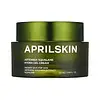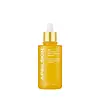What's inside
What's inside
 Key Ingredients
Key Ingredients

 Benefits
Benefits

 Concerns
Concerns

No concerns
 Ingredients Side-by-side
Ingredients Side-by-side

Artemisia Vulgaris Extract 80%
Skin ConditioningWater
Skin ConditioningSqualane 3%
EmollientMethylpropanediol
SolventGlycerin
Humectant1,2-Hexanediol
Skin ConditioningCoco-Caprylate/Caprate
EmollientSaccharide Hydrolysate
HumectantCetearyl Olivate
Ammonium Acryloyldimethyltaurate/Vp Copolymer
Niacinamide
SmoothingSorbitan Olivate
EmulsifyingButylene Glycol
HumectantTrehalose
HumectantEthylhexylglycerin
Skin ConditioningDipotassium Glycyrrhizate
HumectantAllantoin
Skin ConditioningOryza Sativa Bran Extract
Skin ConditioningCarbomer
Emulsion StabilisingXanthan Gum
EmulsifyingFructooligosaccharides
HumectantTromethamine
BufferingAdenosine
Skin ConditioningPullulan
Saccharum Officinarum Extract
MoisturisingSodium Hyaluronate
HumectantIndigofera Tinctoria Extract
MaskingHyaluronic Acid
HumectantMoringa Oleifera Seed Oil
EmollientSodium Hyaluronate Crosspolymer
HumectantHydrolyzed Sodium Hyaluronate
Skin ConditioningHydrolyzed Hyaluronic Acid
HumectantHemerocallis Fulva Flower Extract
Skin ConditioningCeramide NP
Skin ConditioningMyosotis Sylvatica Flower/Leaf/Stem Extract
Skin ConditioningPhytosphingosine
Skin ConditioningSodium Acetylated Hyaluronate
HumectantHydroxypropyltrimonium Hyaluronate
Hydrogenated Lecithin
EmulsifyingCI 75810
Cosmetic ColorantArtemisia Vulgaris Extract 80%, Water, Squalane 3%, Methylpropanediol, Glycerin, 1,2-Hexanediol, Coco-Caprylate/Caprate, Saccharide Hydrolysate, Cetearyl Olivate, Ammonium Acryloyldimethyltaurate/Vp Copolymer, Niacinamide, Sorbitan Olivate, Butylene Glycol, Trehalose, Ethylhexylglycerin, Dipotassium Glycyrrhizate, Allantoin, Oryza Sativa Bran Extract, Carbomer, Xanthan Gum, Fructooligosaccharides, Tromethamine, Adenosine, Pullulan, Saccharum Officinarum Extract, Sodium Hyaluronate, Indigofera Tinctoria Extract, Hyaluronic Acid, Moringa Oleifera Seed Oil, Sodium Hyaluronate Crosspolymer, Hydrolyzed Sodium Hyaluronate, Hydrolyzed Hyaluronic Acid, Hemerocallis Fulva Flower Extract, Ceramide NP, Myosotis Sylvatica Flower/Leaf/Stem Extract, Phytosphingosine, Sodium Acetylated Hyaluronate, Hydroxypropyltrimonium Hyaluronate, Hydrogenated Lecithin, CI 75810
Methylpropanediol
SolventButylene Glycol
HumectantPentylene Glycol
Skin ConditioningBetaine
HumectantXylitol
HumectantSodium Hyaluronate
HumectantSodium Hyaluronate Crosspolymer
HumectantSodium Acetylated Hyaluronate
HumectantHydroxypropyltrimonium Hyaluronate
Hydrolyzed Hyaluronic Acid
HumectantLavandula Angustifolia Flower/Leaf/Stem Extract
MaskingPueraria Lobata Root Extract
HumectantPinus Palustris Leaf Extract
TonicUlmus Davidiana Root Extract
Skin ConditioningOenothera Biennis Flower Extract
AstringentCalendula Officinalis Flower
Skin ConditioningCitrus Sinensis Peel Oil Expressed
PerfumingAllantoin
Skin ConditioningPolyquaternium-51
Skin ConditioningGlyceryl Acrylate/Acrylic Acid Copolymer
HumectantAcrylates/C10-30 Alkyl Acrylate Crosspolymer
Emulsion StabilisingC12-14 Pareth-12
EmulsifyingXanthan Gum
EmulsifyingTromethamine
BufferingCitric Acid
BufferingMethylpropanediol, Butylene Glycol, Pentylene Glycol, Betaine, Xylitol, Sodium Hyaluronate, Sodium Hyaluronate Crosspolymer, Sodium Acetylated Hyaluronate, Hydroxypropyltrimonium Hyaluronate, Hydrolyzed Hyaluronic Acid, Lavandula Angustifolia Flower/Leaf/Stem Extract, Pueraria Lobata Root Extract, Pinus Palustris Leaf Extract, Ulmus Davidiana Root Extract, Oenothera Biennis Flower Extract, Calendula Officinalis Flower, Citrus Sinensis Peel Oil Expressed, Allantoin, Polyquaternium-51, Glyceryl Acrylate/Acrylic Acid Copolymer, Acrylates/C10-30 Alkyl Acrylate Crosspolymer, C12-14 Pareth-12, Xanthan Gum, Tromethamine, Citric Acid
Ingredients Explained
These ingredients are found in both products.
Ingredients higher up in an ingredient list are typically present in a larger amount.
Allantoin is a soothing ingredient known for its protective and moisturizingg properties. Because of this, it is often added to products with strong active ingredients.
Studies show higher concentrations of this ingredient can promote wound healing.
Though it can be derived from the comfrey plant, allantoin is produced synthetically for cosmetic products to ensure purity.
Learn more about AllantoinButylene Glycol (or BG) is used within cosmetic products for a few different reasons:
Overall, Butylene Glycol is a safe and well-rounded ingredient that works well with other ingredients.
Though this ingredient works well with most skin types, some people with sensitive skin may experience a reaction such as allergic rashes, closed comedones, or itchiness.
Learn more about Butylene GlycolHydrolyzed Hyaluronic Acid is a form of hyaluronic acid. It is created by the hydrolysis of hyaluronic acid with a high molecular weight. Once created, Hydrolyzed Hyaluronic Acid has a low molecular weight.
Low molecular weight HA has been shown to hydrate and increase elasticity of the skin. Increasing elasticity is also associated with reduction of wrinkle depth.
One study found topical low molecular weight hyaluronic acid may be considered for the treatment of rosacea in the adult population. However, we always recommend speaking with a professional about your skin concerns.
Hyaluronic acids are a humectant. This means they draw moisture from the air. Hyaluronic acids help moisturize, soothe, and protect the skin.
Read more about other common forms of hyaluronic acid:
Learn more about Hydrolyzed Hyaluronic AcidThis form of hyaluronic acid is produced through fermentation.
According to a manufacturer, it has a positive charge by ionic binding to help moisturize and give hair a smooth feel. This is why you'll find this ingredient in shampoos and body washes.
Methylpropanediol is a synthetic solvent and humectant.
As a solvent, it helps dissolve other ingredients, helping to evenly distribute ingredients throughout the product. This ingredient has also been shown to have antimicrobial properties which makes it a preservative booster.
Methylpropanediol is able to add a bit of moisture to the skin. It also helps other ingredients be better absorbed into the skin, such as salicylic acid.
Learn more about MethylpropanediolSodium Acetylated Hyaluronate is a type of Hyaluronic Acid.
Hyaluronic Acids help moisturize, soothe, and protect the skin.
Read about common types of Hyaluronic Acid here:
Sodium Hyaluronate
Hydrolyzed Hyaluronic Acid
Hyaluronic Acid
Sodium Hyaluronate is hyaluronic acid's salt form. It is commonly derived from the sodium salt of hyaluronic acid.
Like hyaluronic acid, it is great at holding water and acts as a humectant. This makes it a great skin hydrating ingredient.
Sodium Hyaluronate is naturally occurring in our bodies and is mostly found in eye fluid and joints.
These are some other common types of Hyaluronic Acid:
Learn more about Sodium HyaluronateSodium Hyaluronate Crosspolymer is a type of hyaluronic acid. In fact, it is modified version of hyaluronic acid.
The structure of Sodium Hyaluronate Crosspolymer allows it to stay in the skin's top layer for a longer period of time. This allows for even more hydration and humectant action than hyaluronic acid.
These are some other common types of Hyaluronic Acid:
Learn more about Sodium Hyaluronate CrosspolymerTromethamine helps balance the pH and improve the texture of a product. It is synthetically created.
As an emulsifier, Tromethamine prevents oil and water ingredients from separating. This helps stabilize the product and elongate a product's shelf life. Tromethamine also makes a product thicker.
Tromethamine helps balance the pH level of a product. Normal pH level of skin is slightly acidic (~4.75-5.5). The acidity of our skin is maintained by our glands and skin biome. Being slightly acidic allows our skin to create an "acid mantle". This acid mantle is a thin barrier that protects our skin from bacteria and contaminants.
Oral Tromethanmine is an anti-inflammatory drug but plays the role of masking, adding fragrance, and/or balancing pH in skincare.
1,3-Propanediol, 2-amino-2-(hydroxymethyl)-
Learn more about TromethamineXanthan gum is used as a stabilizer and thickener within cosmetic products. It helps give products a sticky, thick feeling - preventing them from being too runny.
On the technical side of things, xanthan gum is a polysaccharide - a combination consisting of multiple sugar molecules bonded together.
Xanthan gum is a pretty common and great ingredient. It is a natural, non-toxic, non-irritating ingredient that is also commonly used in food products.
Learn more about Xanthan Gum